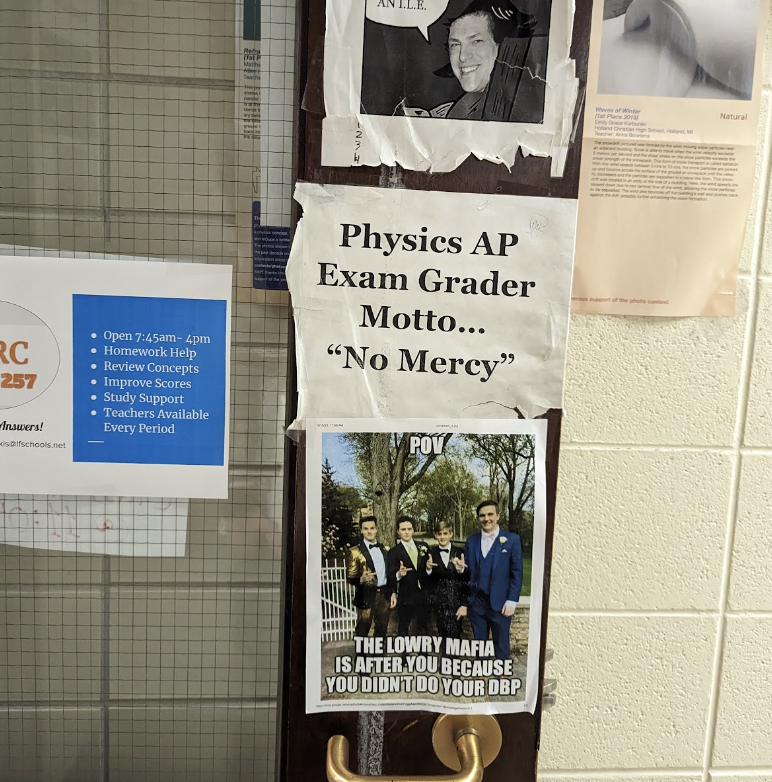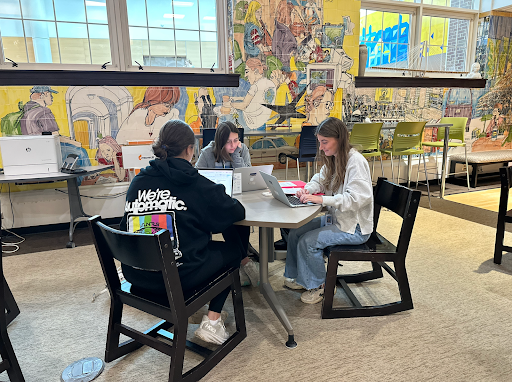“No Mercy” reads the quote from a Physics AP exam grader that is taped to the door of Room 224. This is the room in which Physics Teacher Mr. Matt Lowry teaches his classes.
It is well-known that AP classes are difficult, but it begs the question, ‘Should students be afraid to take AP classes?’
Yes … and no.
A large factor students need to manage in all aspects of their life is maintaining a healthy balance. Each student has a unique life that they individually personalize with time commitments to clubs, sports, and extracurriculars. With each AP class they commit themself to, that’s time they’re taking away from another activity.
Students who have found themselves balancing a schedule full of AP classes, sports, and clubs tend to be extraordinarily stressed out. Lowry says that is “because no matter how good or well prepared the student is, you can’t put a 25th hour into a 24 hour day.”
Before thinking about the class itself, students should have some self-awareness about how much time they are able to put aside for school. First, take time to consider how much free time you want, how much time your extracurriculars take up, and then ask yourself if what you have left over is enough to succeed in your classes. Even though you might have a desire to do all these things, it has to be considered whether or not it is both possible and healthy for you to do these activities at the same time in tandem with your classes.
“There is, unfortunately, this idea that students can do it all, but they can’t,” Lowry said.
For many students, AP classes are scary, and that is because challenging yourself to the extent of a college level class is a risk.
English Instructional Director Kristen Carlson elaborated on the benefit of this risk. “During your senior year, colleges aren’t only interested in the [AP Test] scores. They’re interested in your transcript as a whole.”
Beyond the objective benefits of taking an AP class, students should be asking themselves why they want to take the AP class. Do they find it interesting? Does it relate to what they want to do later in life?
If the answers to these questions are yes, but they still find themselves worrying, Carlson recommends that students should “talk with a teacher that they trust in the discipline and say, ‘You know, this is something I’m interested in. What do you think?’”
If the answers to these questions are no, it may be valuable to take an introspective look into why it is they they’re taking this class. Oftentimes students feel obligated to take a more difficult class to impress their friends.
“I try to remind my students… you have to prioritize yourself and at the end of the day, it doesn’t matter if you’re going to do something different than your friends,” Counselor Ms. Maureen Lamick said. “And I think as we get older, maturity is part of that right to be able to say, I know this makes me a little bit uncomfortable. Maybe I’m doing something different than my friends but I know it’s best for me.”
Doing what’s best for you is a two-way street. Some students have friends going into AP classes when that isn’t what works for them, and some students are going into AP classes which aren’t what works for their friends.
For many reasons, students at LFHS strive to make themselves look better through more extracurriculars, sports, and harder classes such as APs. More often than not, students at LFHS are pushing themselves too hard. Students who are feeling overwhelmed should prioritize taking healthy steps back rather than pushing themselves harder..
“I don’t feel like I have to have a lot of conversations with students here about, how they need to do more,” said Lamick, “Sometimes I say, okay, you do all of these things. Does this feel good to you? If it doesn’t feel good to you, what do we need to prioritize keeping?”
Even through all the difficulties, that’s not to say students shouldn’t even consider taking on AP classes with a busy schedule.
A large aspect of going through high school is preparing students to go on to college to transition into adult life. As students go through high school, they are steadily given more responsibilities and independence.
However the other aspect of high school, especially at LFHS, is that we have dedicated staff to guide students through these choices. If anyone ever feels unsure about what’s going on with their academics, they can find just about anyone to answer their questions.
If a student is still on the fence about taking an AP class, they should speak with their counselor and their teachers. Everyone’s limits and wants are different, and so what works for one student might not work for another.
So should students be afraid?
Well yes, these classes are more difficult than the standard class. But these challenges provide opportunities for students to refine study habits and problem solving. If there’s a class with an AP label that interests a student, they should try it.
If a student is afraid, it should be noted that stress and nervousness for classes is viewed in an unfairly negative light. Lowry believes that nervousness is a tool to academic success. “[nervousness] keeps you sharp. It keeps you attentive. It keeps you on the edge. But you don’t want so much of it that you can’t act when you need to. It’s a balance.”
The key to academic success is in finding balance.








